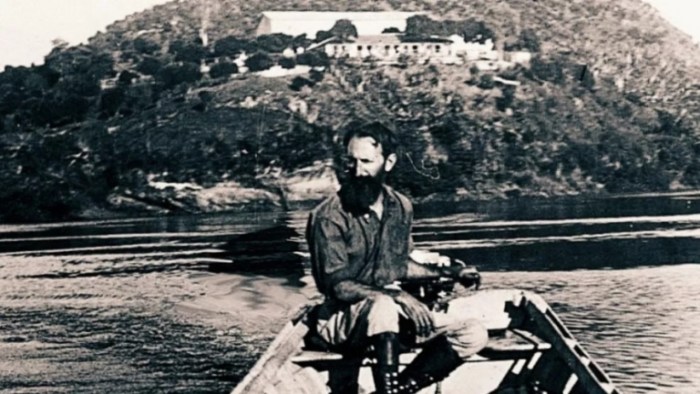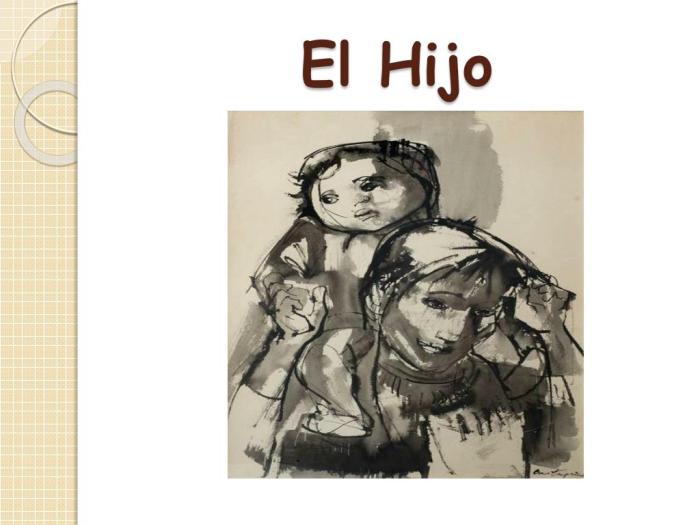El Hijo Horacio Quiroga English offers an exceptional literary experience that delves into the depths of human emotion, nature, and inner conflict. Horacio Quiroga’s masterpiece captivates readers with its profound themes, evocative imagery, and unforgettable characters.
The story revolves around a father and son living in the unforgiving wilderness of the Amazon rainforest. As they confront the challenges of their isolated existence, the father’s complex motivations and the son’s vulnerability become intertwined in a compelling narrative.
Horacio Quiroga
Horacio Quiroga was a Uruguayan writer and journalist who lived from 1878 to 1937. He is considered one of the most important figures in Latin American literature, particularly in the genre of short stories.Quiroga was born in Salto, Uruguay, and spent his early years in the countryside.
He was orphaned at a young age and was raised by his uncle. Quiroga began writing at a young age, and his first published work was a collection of poems called “Los arrecifes de coral” (The Coral Reefs).
Major Literary Works
Quiroga’s most famous works are his short stories, which are often characterized by their dark and violent themes. Some of his most well-known stories include “El hombre muerto” (The Dead Man), “La gallina degollada” (The Beheaded Hen), and “El almohadón de plumas” (The Feather Pillow).
El Hijo: A Critical Analysis
Significance of “El Hijo” in Quiroga’s Literary Corpus
“El Hijo” holds a significant place in Horacio Quiroga’s literary repertoire, reflecting his mastery of the short story form and his preoccupation with themes of nature, isolation, and the human condition. It showcases his ability to create haunting and atmospheric narratives that explore the depths of human psychology.
Main Themes and Motifs Explored in the Story
“El Hijo” delves into several key themes that permeate Quiroga’s work:
- The Power of Nature:The story highlights the overwhelming presence of the natural world, which exerts a profound influence on the characters’ lives. The jungle is portrayed as a dangerous and unforgiving force, threatening the protagonists’ survival.
- Isolation and Loneliness:The characters in “El Hijo” are isolated from society, both physically and emotionally. This isolation leads to a sense of loneliness and vulnerability, which ultimately contributes to their downfall.
- The Fragility of Human Life:The story explores the fragility of human life in the face of nature’s harshness. The characters are constantly threatened by illness, injury, and death, highlighting the precariousness of human existence.
Use of Symbolism and Imagery in the Story
Quiroga employs powerful symbolism and imagery throughout “El Hijo” to enhance its themes and create a vivid and memorable narrative. For instance:
- The Jungle:The jungle represents the untamed and dangerous forces of nature that threaten the characters’ lives. It is a symbol of the unknown and the unpredictable.
- The Fever:The fever that afflicts the child is a symbol of the illness and suffering that can strike unexpectedly. It is also a metaphor for the psychological turmoil that the characters experience.
- The Dead Child:The death of the child symbolizes the fragility of human life and the inevitability of loss. It is a poignant reminder of the fleeting nature of existence.
The Protagonist: A Character Study

The father in “El Hijo” is a complex and enigmatic figure. A man of contradictions, he is both loving and abusive, protective and neglectful. His motivations are often unclear, and his actions are frequently impulsive and irrational.
One of the most striking things about the father is his intense love for his son. He is willing to go to great lengths to protect him, and he is deeply affected by his son’s suffering. However, the father’s love is often expressed in a distorted and unhealthy way.
He is possessive and controlling, and he often uses violence to discipline his son.
The father’s relationship with his son is a complex one. It is marked by both love and violence, and it is constantly evolving. As the story progresses, the father’s love for his son grows stronger, but so does his violence.
In the end, the father’s love for his son is not enough to save him from his own destructive impulses.
The Father’s Motivations
The father’s motivations are often unclear. He is a man of contradictions, and his actions are frequently impulsive and irrational. However, there are a few key factors that seem to drive his behavior.
- His love for his son.The father loves his son deeply, and he is willing to go to great lengths to protect him. However, his love is often expressed in a distorted and unhealthy way.
- His own childhood experiences.The father was raised in a violent and abusive home. As a result, he has a distorted view of what is considered normal behavior. He believes that violence is an acceptable way to discipline a child.
- His mental illness.The father is mentally ill, and this affects his behavior in a number of ways. He is impulsive, irrational, and often unable to control his anger.
These are just a few of the factors that seem to drive the father’s behavior. It is important to remember that he is a complex character, and his motivations are not always clear.
The Father’s Conflicts, El hijo horacio quiroga english
The father faces a number of conflicts throughout the story. These conflicts include:
- His love for his son vs. his own violent impulses.The father loves his son deeply, but he is also a violent man. He struggles to control his anger, and he often takes it out on his son.
- His desire to be a good father vs. his own childhood experiences.The father wants to be a good father, but he was raised in a violent and abusive home. As a result, he has a distorted view of what is considered normal behavior.
- His mental illness.The father’s mental illness affects his behavior in a number of ways. He is impulsive, irrational, and often unable to control his anger.
These are just a few of the conflicts that the father faces throughout the story. These conflicts are often interconnected, and they make it difficult for the father to find peace and happiness.
The Father’s Psychological State
The father’s psychological state is complex and troubled. He is a man who is deeply affected by his own childhood experiences. As a result, he has a distorted view of what is considered normal behavior. He is also mentally ill, which affects his behavior in a number of ways.
The father is a man who is full of contradictions. He is both loving and abusive, protective and neglectful. He is a man who is struggling to find peace and happiness in a world that he does not understand.
The Son: A Symbol of Innocence and Vulnerability: El Hijo Horacio Quiroga English
The son in “El Hijo” is a potent symbol of innocence and vulnerability. He represents the fragility of life and the innocence that is often lost in the face of adversity. Through the son’s journey, Quiroga explores the themes of loss, grief, and the search for meaning in the face of tragedy.
The Son’s Role in Highlighting the Father’s Flaws
The son’s presence serves to highlight the father’s flaws and shortcomings. The father’s inability to protect his son reveals his weakness and vulnerability. His desperation to find a cure for his son’s illness demonstrates his hubris and his unwillingness to accept the limitations of human existence.
The Son’s Journey and the Story’s Themes
The son’s journey mirrors the larger themes of the story. His suffering and eventual death represent the pain and loss that is an inherent part of human life. His search for a cure symbolizes the futile pursuit of meaning in the face of tragedy.
Through the son’s journey, Quiroga explores the human condition and the existential questions that arise in the face of suffering and loss.
Nature and the Setting: A Reflection of Inner Conflict

In “El Hijo,” nature plays a crucial role in reflecting the characters’ inner struggles and foreshadowing the tragic events to come. The untamed and unpredictable wilderness serves as a mirror to the protagonist’s tumultuous emotions and the turmoil within his family.
Foreshadowing and Symbolism in the Setting
From the outset, the setting foreshadows the impending tragedy. The description of the forest as “a green hell” and “a labyrinth of thorns” suggests the dangers and obstacles that lie ahead for the characters. The storm that rages during the protagonist’s journey symbolizes the inner turmoil he faces as he grapples with his father’s death and his own sense of isolation.
Throughout the story, the natural environment mirrors the protagonist’s emotional state. The dense vegetation represents the suffocating weight of his grief and the challenges he must overcome. The river, which he must cross to reach his destination, symbolizes the perilous journey he must undertake both physically and emotionally.
Literary Techniques and Style
Horacio Quiroga’s “El Hijo” is a masterfully crafted short story that employs a range of literary techniques to create a profound and haunting narrative. The story’s narrative structure, point of view, and use of language work in tandem to convey the protagonist’s inner turmoil and the tragic events that unfold.
Narrative Structure
The story is presented in a linear fashion, with a clear beginning, middle, and end. However, Quiroga employs flashbacks and foreshadowing to create a sense of suspense and to reveal the protagonist’s past and motivations. The story’s climax occurs when the protagonist realizes the true nature of his son’s illness, and the resolution is both tragic and inevitable.
El hijo de Horacio Quiroga, que vivió una vida fascinante, inspiró a muchos. Para comenzar el día con una nota refrescante, ¿qué tal un delicioso café? ¡Yo, por mi parte, disfruto de una taza por la mañana! Volviendo a la historia de El hijo de Horacio Quiroga, sus aventuras continúan cautivando a los lectores.
Point of View
“El Hijo” is narrated from the first-person perspective of the protagonist, allowing the reader to experience the events of the story through his eyes. This subjective perspective intensifies the protagonist’s emotional turmoil and makes the reader feel deeply connected to his plight.
Use of Language
Quiroga’s use of language is both precise and evocative. He employs vivid imagery and sensory details to create a palpable sense of atmosphere and to convey the protagonist’s inner state. The story is written in a simple and direct style, which enhances its emotional impact and makes it accessible to a wide range of readers.
Historical and Cultural Context
Horacio Quiroga’s “El Hijo” was written during a period of significant social and political upheaval in Latin America. The late 19th and early 20th centuries saw the rise of new ideologies, the emergence of modernism in literature, and the growing influence of European culture on Latin American societies.
Quiroga’s writing reflects the social and political issues of his time. “El Hijo” explores themes of isolation, loss, and the fragility of human life in the face of nature’s unforgiving power. These themes resonated with readers who were living through a period of rapid social and economic change.
Influence of Literary Movements
Quiroga’s writing was also influenced by other literary movements, including realism and naturalism. Realism emphasized the depiction of everyday life and the experiences of ordinary people. Naturalism took this approach further, exploring the darker aspects of human nature and the influence of environment on human behavior.
Quiroga’s use of vivid imagery and detailed descriptions in “El Hijo” reflects the influence of these literary movements.
FAQ
What is the significance of nature in El Hijo Horacio Quiroga?
Nature plays a crucial role in the story, reflecting the characters’ inner struggles and foreshadowing their ultimate fate.
How does the father’s character evolve throughout the story?
The father’s motivations and psychological state undergo significant changes as he grapples with his responsibilities and the challenges of his environment.
What is the symbolic meaning of the son in El Hijo Horacio Quiroga?
The son represents innocence, vulnerability, and the hope for redemption in the face of adversity.